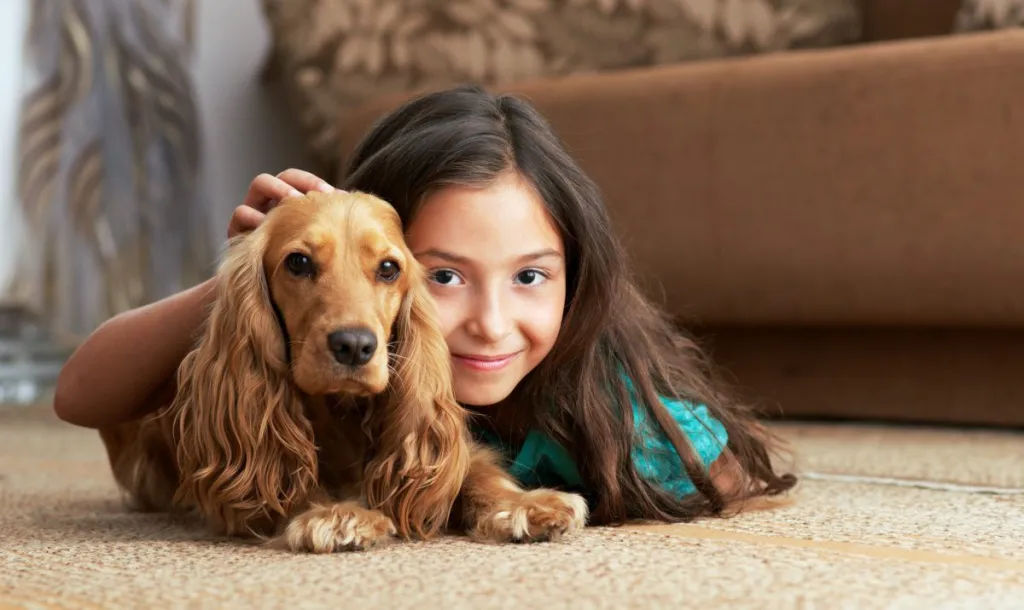Introducing a dog into your family can be one of the most rewarding and enriching decisions you’ll ever make, especially if you have kids. Dogs are not just pets; they become part of the family, providing unparalleled companionship, love, and even lessons in responsibility for your children. However, not all dog breeds are suitable for the chaotic, loud, and often unpredictable environment a family with kids can present. Therefore, it’s crucial to choose a breed that aligns with your family’s lifestyle, energy levels, and needs. Below, we’ve rounded up the best dog breeds known for their compatibility with kids, families, and babies to help you make an informed decision.
What is the best dog breed for kids?
Golden Retrievers have long stood as the ultimate dog breed for kids, and it’s easy to see why. Known for their patient, friendly nature, and intelligence, Golden Retrievers make exceptional family pets. These dogs thrive on companionship and are exceedingly loyal. Plus, their eagerness to please makes them highly trainable. With their soft mouth, a Golden Retriever can play fetch with your children without any risk of an overly nippy interaction. However, they do require regular exercise to keep their jovial spirit in check. So, if your family enjoys backyard games or nature hikes, a Golden Retriever will fit right in.
What dog breeds are good with kids?
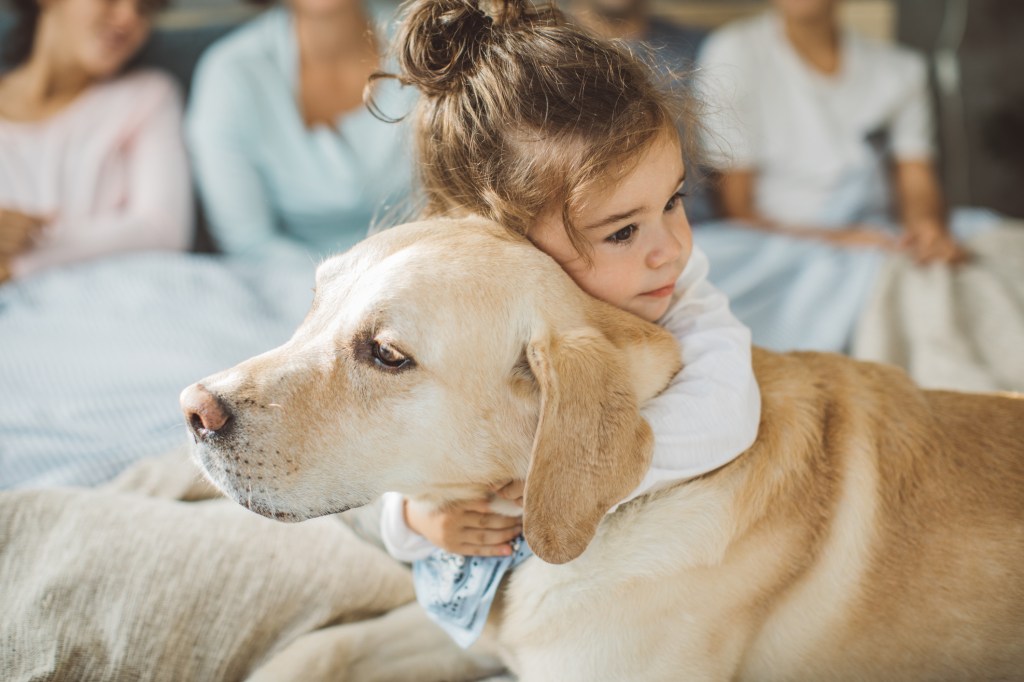
The most kid-friendly dog breeds are those who are known for their gentle temperament, patience, and ability to bond with kids. The breeds that often excel in these areas tend to be adaptable, friendly, and capable of handling the noisy, energetic atmosphere that usually comes with a household bustling with children.
Labrador Retriever
If you’re looking for a dog who embodies the spirit of family life, the Labrador Retriever is hard to beat. Labs are famously friendly, outgoing, and high-spirited canines who have more than enough affection to go around for a family looking for a medium-to-large dog. Their patience and gentle demeanor make them fantastic playmates for your kids. What’s more, they are intelligent and trainable, meaning you’ll have an easier time teaching them the rules of the house.
Beagle
Beagles are another fantastic choice for families with kids, especially due to their size and sturdy build. These dogs are adventurous and never tire of playing, which can be perfect for keeping up with energetic children. They’re also incredibly friendly and get along well with other pets. It’s worth noting that Beagles are known for their distinctive bark and howl, but with proper training, they can learn to use their voices judiciously. However, owing to their strong sense of smell, they may be prone to wandering off if they catch an intriguing scent. Therefore, it’s important to have a securely fenced yard or keep them on a leash during outdoor adventures.
Boxer
Despite their sometimes imposing appearance, Boxers have a playful and affectionate side that shines through when around their family members, especially children. In fact, they are known for their strong protective instincts, which makes them excellent guard dogs for families. Moreover, their energy and enthusiasm match well with active families who enjoy regular outdoor activities. That said, Boxers require consistent training and socialization from an early age to ensure they develop well-rounded personalities.
What is the best family dog?
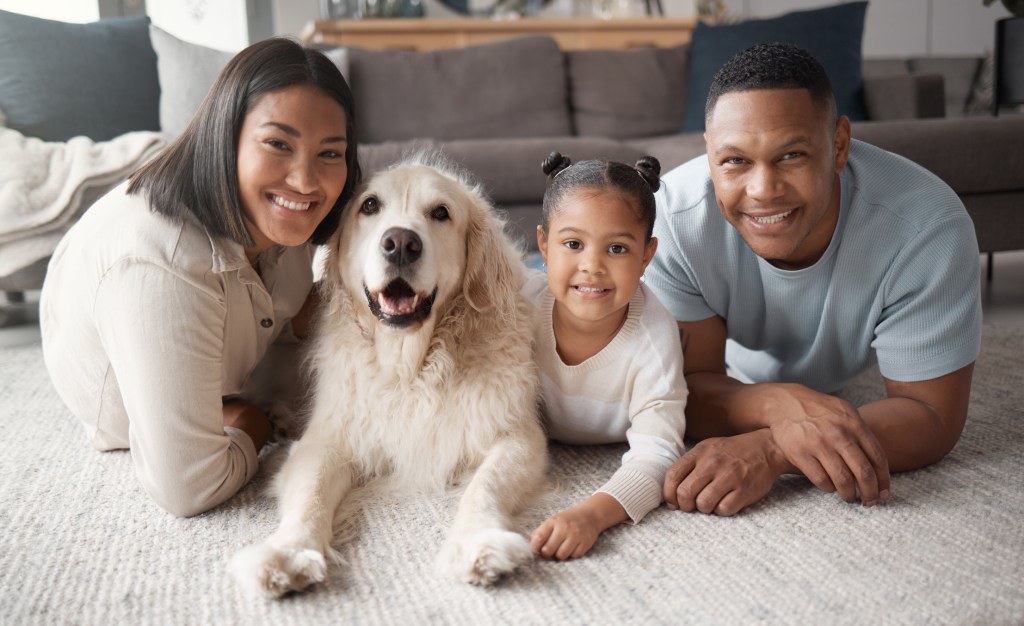
When it comes to the overall best family dog, the debate often lands between a Golden Retriever and a Labrador Retriever. Given their similarities in temperament, intelligence, and loyalty, either breed could rightfully claim the title. However, Labrador Retrievers slightly edge out due to their versatility and adaptability to various lifestyles and environments, making them a top-notch choice for most families. Remember, a Labrador’s love for life — and food, thanks to a genetic mutation — knows no bounds, so engaging in plenty of playtime and regular exercise will keep your pet both happy and healthy.
What other dog breeds are best for families?
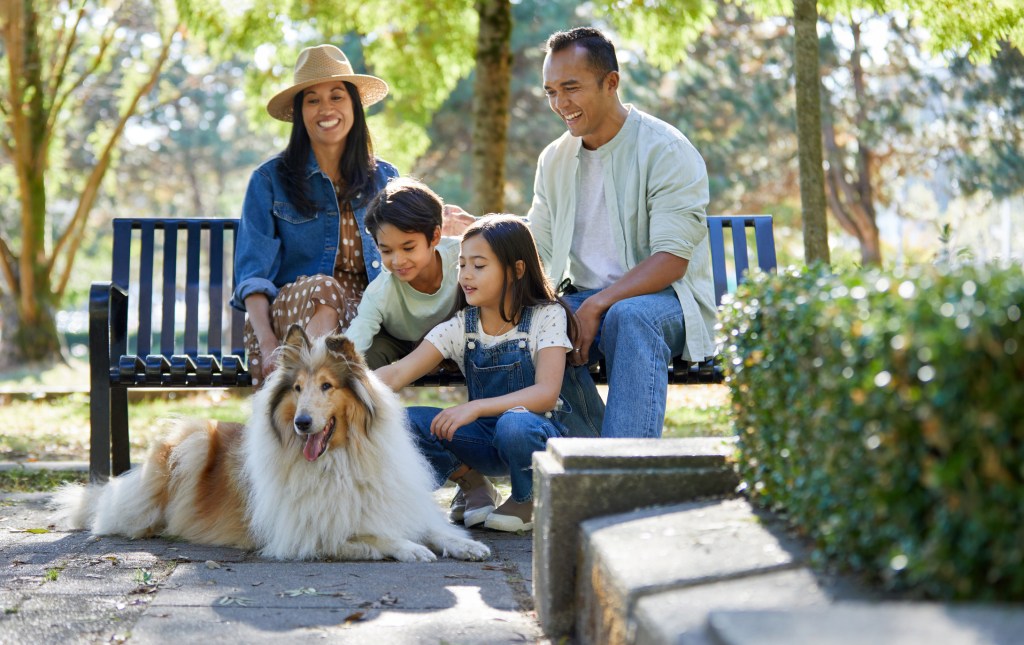
Beyond the popular Labrador Retriever and Golden Retriever, several other breeds make excellent additions to family units. Below are some top contenders that might just steal your heart and become your next four-legged family member.
Cavalier King Charles Spaniel
If you’re seeking a dog breed that can be both an affectionate pet and a patient family member, the Cavalier King Charles Spaniel might just be your perfect match. Known for their gentle nature, these dogs adore being part of family activities, whether it’s a lazy afternoon on the couch or a more adventurous day out in the park. They make amazing playmates for children, showing a gentle disposition as well as an eagerness to engage in play. Additionally, their small size means they fit well in various living situations, from apartments to larger homes with yards.
Bulldog
The Bulldog breed, with its distinctive, jowly appearance, might not immediately spring to mind when you think of the perfect family dog. However, it’s precisely their laid-back attitude that makes them a wonderful choice for families. Bulldogs are incredibly resilient and can handle the rough play from children better than many other breeds. Plus, their moderate energy levels mean they won’t require the constant attention and exercise that more high-energy breeds demand. Bulldogs are also known for their loyalty, forming strong bonds with all family members and often becoming particularly protective of the children in the home.
Collie
Collies are popularly known as the breed of “Lassie,” the TV hero who saved the day time and again. The breed has a rich history of working closely alongside humans, which translates into their remarkable ability to understand and communicate with their family members today. Collies are wonderfully suited to family life, with a keen sensitivity to their owners’ needs and a protective instinct that makes them great watchdogs. These dogs are also good with kids since they have a patient and nurturing demeanor. It’s important to note, however, that they may display their herding instinct through gentle herding of children. Nonetheless, you can channel this positively with the right training and socialization. That said, anyone with a toddler in tow knows how hard it can be to get out the door, so perhaps there are some upsides to a Collie’s propensity to keep things moving.
What is the best dog with babies?
One of the best dogs to have around babies is the Newfoundland or “Newfie.” As a matter of fact, Newfoundlands have earned a reputation as the “nanny dog.” Their protective instincts and unwavering loyalty make them perfect companions for your little ones. Interestingly, this innate behavior traces back to their heritage. Newfoundland dogs frequently served as protectors for the children of fishermen in their homeland.
That being said, it’s always advisable to supervise dogs when around babies. Training is crucial, not only in obedience but also in familiarizing your dog with the behaviors and sounds of a new baby. It’s equally important to teach your child how to interact safely with dogs as they grow.
What is the best small dog for children?
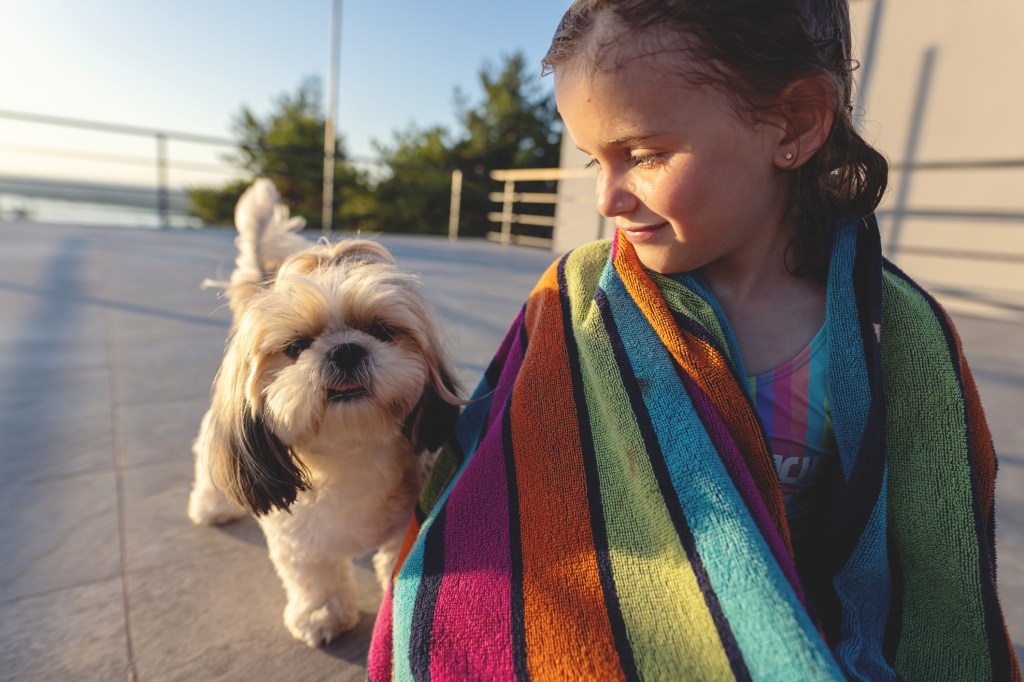
Boston Terriers are fantastic small dogs for children due to their gentle nature and sturdy build. Moreover, Pugs — with their comedic personality and loving disposition — will easily become your child’s loyal sidekick, eager to join in on any indoor or outdoor activities. The Bichon Frisé is another excellent pet, with their friendly attitude and hypoallergenic coat, making them perfect for kids with allergies. Similarly, Shih Tzus make great lap dogs for quieter children, yet they’re always up for a bit of playtime.
Which medium-sized dogs are good pets for little kids?

For families wanting a medium-sized dog who would be a great match for little kids, consider breeds known for their friendly demeanor and patience. Among them, Cocker Spaniels top the list with their cheerful and affectionate nature. They enjoy being part of family activities and their medium size and moderate to high energy levels make them one of the best dogs for kids — always ready for a game or a cuddle session. Besides, their silky fur and endearing eyes are just a bonus, making them irresistible cuddle buddies for your little ones.
Other notable mentions include the Basset Hound, Australian Shepherd, and Vizsla. Basset Hounds, with their gentle and laid-back personality, are great for kids who appreciate calm interactions. Meanwhile, the Australian Shepherd makes a great furry friend for more active children who enjoy being outdoors and engaging in play that requires a bit of thinking — like fetch or agility training. Lastly, Vizslas — often referred to as “velcro dogs” for their strong attachment to their family members — are known for their affectionate nature and gentle manner.
What large dog breeds are good with energetic kids?
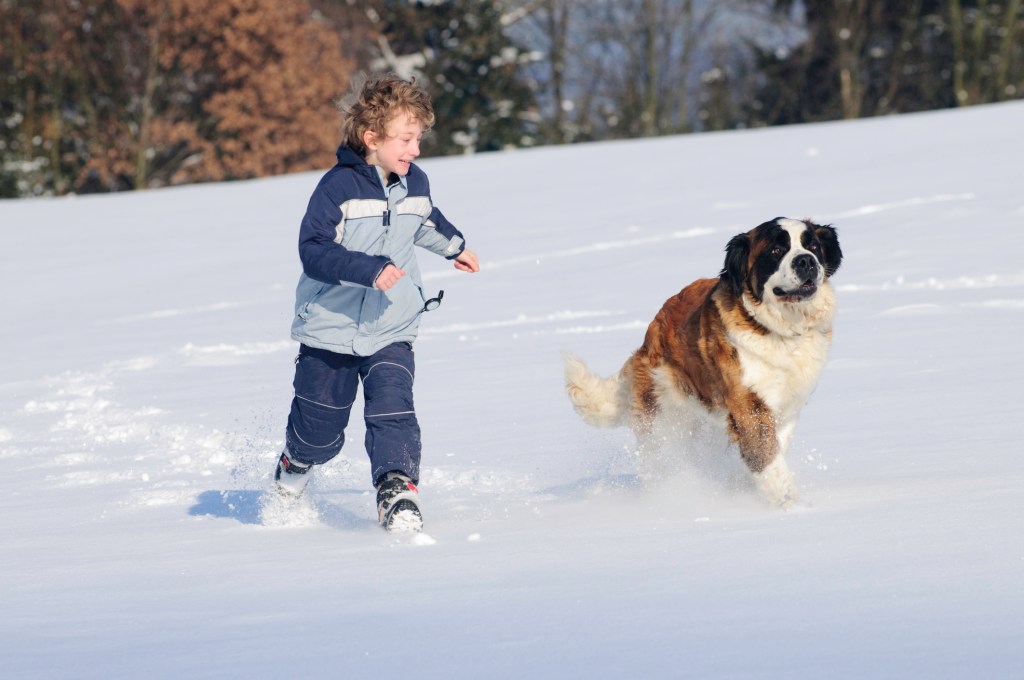
If your family radiates energy and your home is always buzzing with activity, having a large dog breed that not only keeps up but thrives in this environment is essential. For those of you with energetic kids, the right dog can be the perfect blend of protector, playmate, and patient pal. Take, for instance, the Saint Bernard; don’t let their massive size fool you! This breed is known for its calm demeanor and tolerance, making it a fantastic pet for lively children. Their patience seems almost boundless, and they have a knack for participating in children’s games with a careful yet playful attitude.
Then, there’s the robust and reliable Rottweiler. With a strong and confident guardian like a Rottweiler, you’ll have an active playmate who is fiercely loyal to their family. Proper training and socialization are key, and once those are in place, Rotties blend seamlessly into the family dynamic. Meanwhile, Great Danes — known affectionately as “gentle giants” — tower over most other breeds yet display exquisite gentleness and patience with children. With their almost bear-like appearance, the Tibetan Mastiff stands as a majestic protector, having a watchful eye and a serene presence that’s surprisingly compatible with spirited youngsters. Furthermore, the Bernese Mountain Dog, with their fluffy coat and sturdy build, is another large breed that brings incomparable sweetness and gentleness to families.
What is the best guard dog for families?
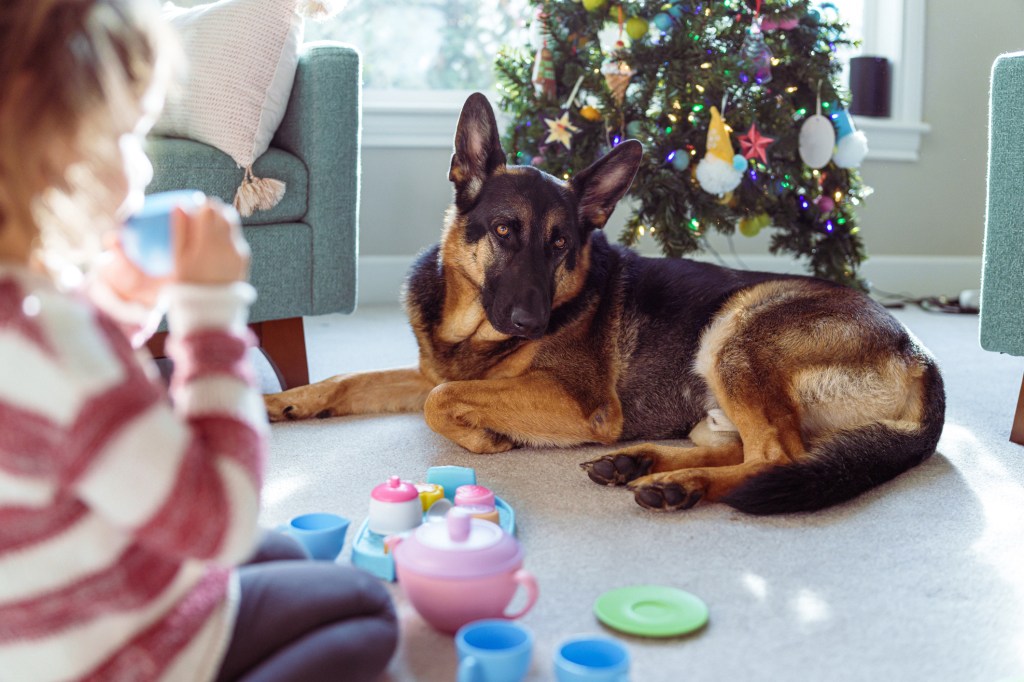
When considering the best guard dog for your family, the German Shepherd tops the chart for their remarkable balance of intelligence, courage, and devotion. These dogs will be ready to play a game of fetch with your kids and stand guard against any perceived threat with equal enthusiasm. What sets German Shepherds apart is their exceptional trainability. With the right guidance, you can teach them how to distinguish between normal behavior and potential danger. This will help prevent their protective instincts from turning into overprotectiveness.
What are the best dog breeds for kids with mental health conditions?
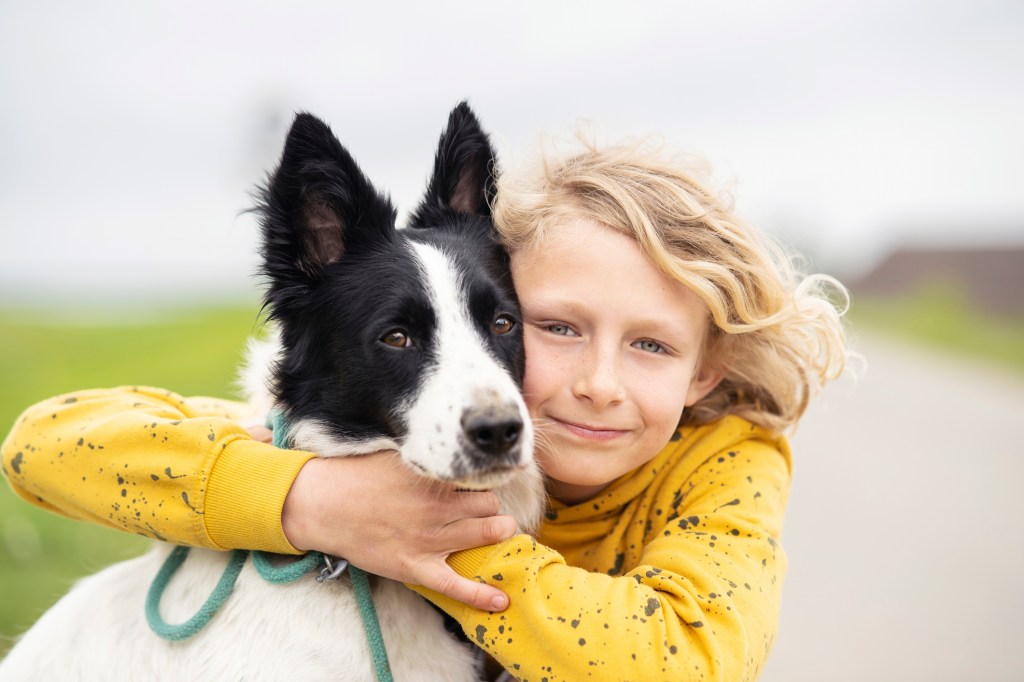
If your child has a mental health condition such as autism, ADHD, or anxiety, finding the right four-legged companion can make a world of difference in their life. Not just any dog will do — their new friend needs to be a breed that resonates with their unique needs, ensuring a bond that fosters emotional growth and stability.
Autism
For a child with autism, the world can sometimes feel overwhelming — a place filled with unpredictable noises, bustling crowds, and intense emotions. In the midst of such chaos, certain dog breeds can take the role of calming anchors and faithful friends. That being said, Labrador Retrievers are known for their ability to connect deeply with children on the autism spectrum.
Similarly, the Golden Retriever’s gentle and intuitive nature makes them ideal for providing emotional support. They have an innate ability to remain calm in stressful situations, offering a comforting presence that can help minimize meltdowns and encourage positive social interactions. If your living space is limited, you may also consider a smaller breed like the Cavalier King Charles Spaniel, whose affectionate and adaptive personality can bring a sense of peace to any home.
ADHD
Children with ADHD can greatly benefit from dogs who are as energetic and spirited as they are. Accordingly, Boxers and Border Collies are fantastic breeds for keeping up with kids who are always on the move. These canines can help your child channel their boundless energy into positive activities — such as walking or playing fetch — which can improve focus and reduce impulsiveness over time. Additionally, the loyal and trainable nature of these dogs can assist in creating a structured routine, teaching responsibility and care.
Anxiety
On the flip side, if your child struggles with anxiety, a dog with a calming presence and empathetic nature can be a soothing balm. The Cavalier King Charles Spaniel, with their soulful eyes and gentle demeanor, can often sense when their human needs extra cuddles or a quiet companion. Moreover, their manageable size makes them perfect for cuddling, providing a soothing presence that can help reduce anxiety levels. Another breed that is incredibly intelligent and empathetic is the Standard Poodle. They quickly pick up on their owner’s emotions and respond with comforting nuzzles, which can be incredibly reassuring for an anxious child.
What are the best hypoallergenic dogs and non-shedding breeds for families?
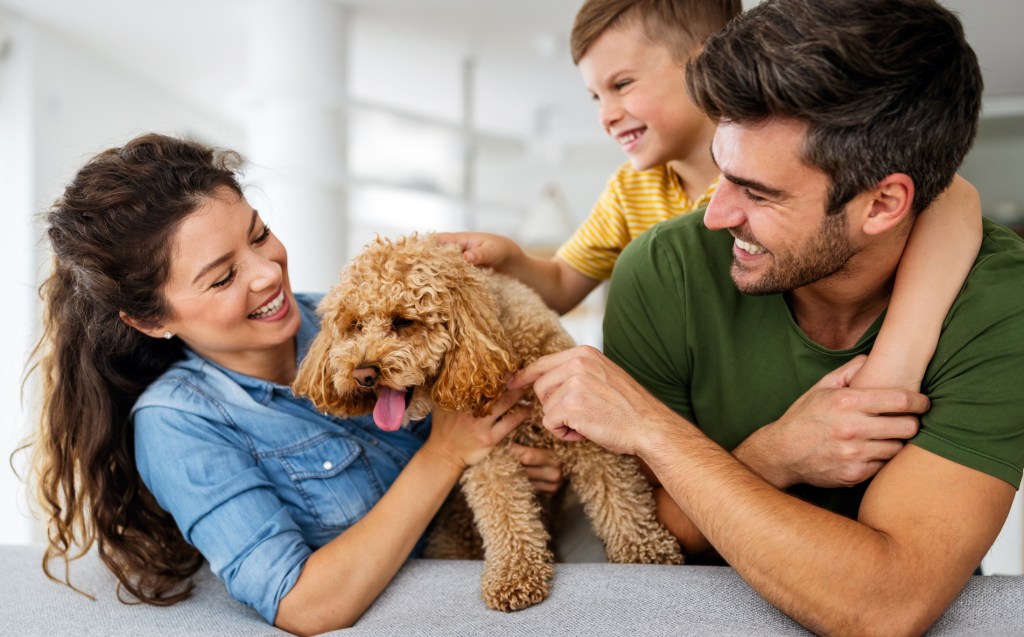
When your family is “itching” to add a four-legged friend to the mix, but someone’s allergies stand in the way, fear not. Your dreams of puppy cuddles and adorable family photos don’t have to go up in sneezes, scratches, and sniffles. Hypoallergenic dogs might be your lifesaver! These breeds typically have hair instead of fur, shed less, and are known to produce fewer allergens. But let’s clarify one thing: no dog is 100% hypoallergenic. However, some breeds come close, making your life much easier and less itchy.
Poodle
Poodles are the quintessence of a hypoallergenic breed. They sport a fur coat that’s more akin to human hair than traditional dog fur. This unique feature drastically reduces dander and shedding, making them the best choice for families with allergies. Moreover, this means you’ll spend less time cleaning dog hair off of furniture and have more time to bond with your kids.
Beyond a Poodle’s hypoallergenic traits, this breed is known for its intelligence and versatility. In fact, Poodles come in various sizes, including Standard, Miniature, and Toy. What’s more, there are a variety of popular Poodle mixes and Doodle dogs which have the best traits of both their parentages. This means they can effortlessly fit into various family dynamics and lifestyles.
Bichon Frisé
With a cheerful demeanor and a face that’s hard to resist, the Bichon Frisé makes an excellent addition to any family, especially those with mild allergies. Their soft, puffy coat sheds less but does requires regular grooming to keep them looking their best. Besides their low-shedding qualities, Bichons are known for their playful nature and adaptability, thriving in both apartments and houses with yards.
Portuguese Water Dog
Remember Bo and Sunny, the former First Dogs of the United States? These Portuguese Water Dogs stole the hearts of the nation with good reason. Known for their robust health, spirited nature, and non-shedding, hypoallergenic coats, they’re built for action and adventure. If your family loves outdoor activities and is looking for a medium-sized, energetic breed that can keep up while keeping allergies at bay, this breed could be your match.
Factors to consider before bringing a dog home
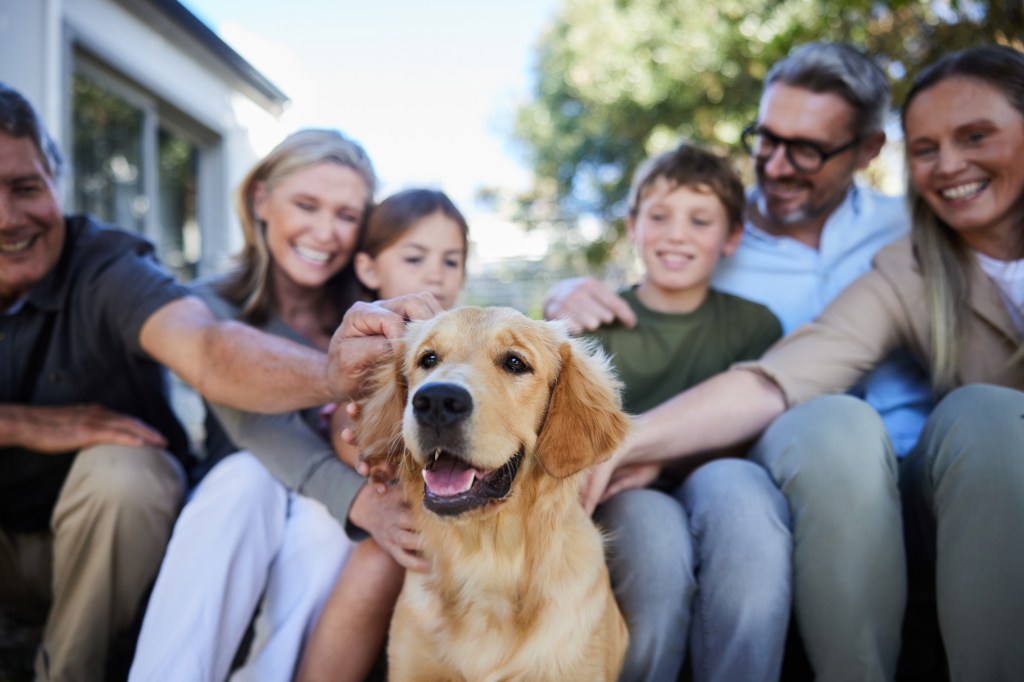
Getting a dog is a huge responsibility — especially if you are already caring for children. Here are a few more things to keep in mind as a parent adopting a dog:
- Size and strength: Opt for a dog who is compatible with the size and strength of young children. Large, giant, or strong breeds might unintentionally knock over or overpower small kids during play, leading to accidental injuries.
- Temperament: Evaluate the dog’s temperament thoroughly before adoption. This is true whether you opt to bring home a puppy, an adolescent dog, or even a senior. An ideal family dog should be patient, gentle, and tolerant, especially when dealing with the exuberance of young children.
- Training and socialization: Prioritize adopting a dog who has undergone proper training and socialization. A well-trained dog is more likely to interact positively with children and respond to commands, creating a safer environment.
- Health and veterinary care: Ensure the dog is in good health and up-to-date with vaccinations before bringing them home. Regular veterinary check-ups are vital to monitor the dog’s health and protect both the pet and the children.
- Adjustment Period: Allow time — up to three months — for your dog and your children to adapt to each other’s presence. Gradual introductions and respecting the dog’s space will foster a positive relationship.
- Family involvement: Involve all family members in caring for your dog — including feeding, walking, and playtime. Sharing responsibilities promotes bonding and helps the animal feel integrated into the family unit.
- Preparing your home: Prepare your home for the new pet’s arrival. Remove any hazardous items, provide a designated space for the dog, and establish rules for interactions with the children or baby.
The most important question for parents to ask themselves before adopting a dog
Beyond these aforementioned factors and figuring out the best dog breeds for kids or a new baby, however, are bigger questions. Perhaps the most fundamental question to ask yourself is, “Do I personally have the time to train a dog and supervise a dog around my children?” If the answer is no, you might want to wait until your kids are older — many recommend age 5 or up — before bringing a dog home.
